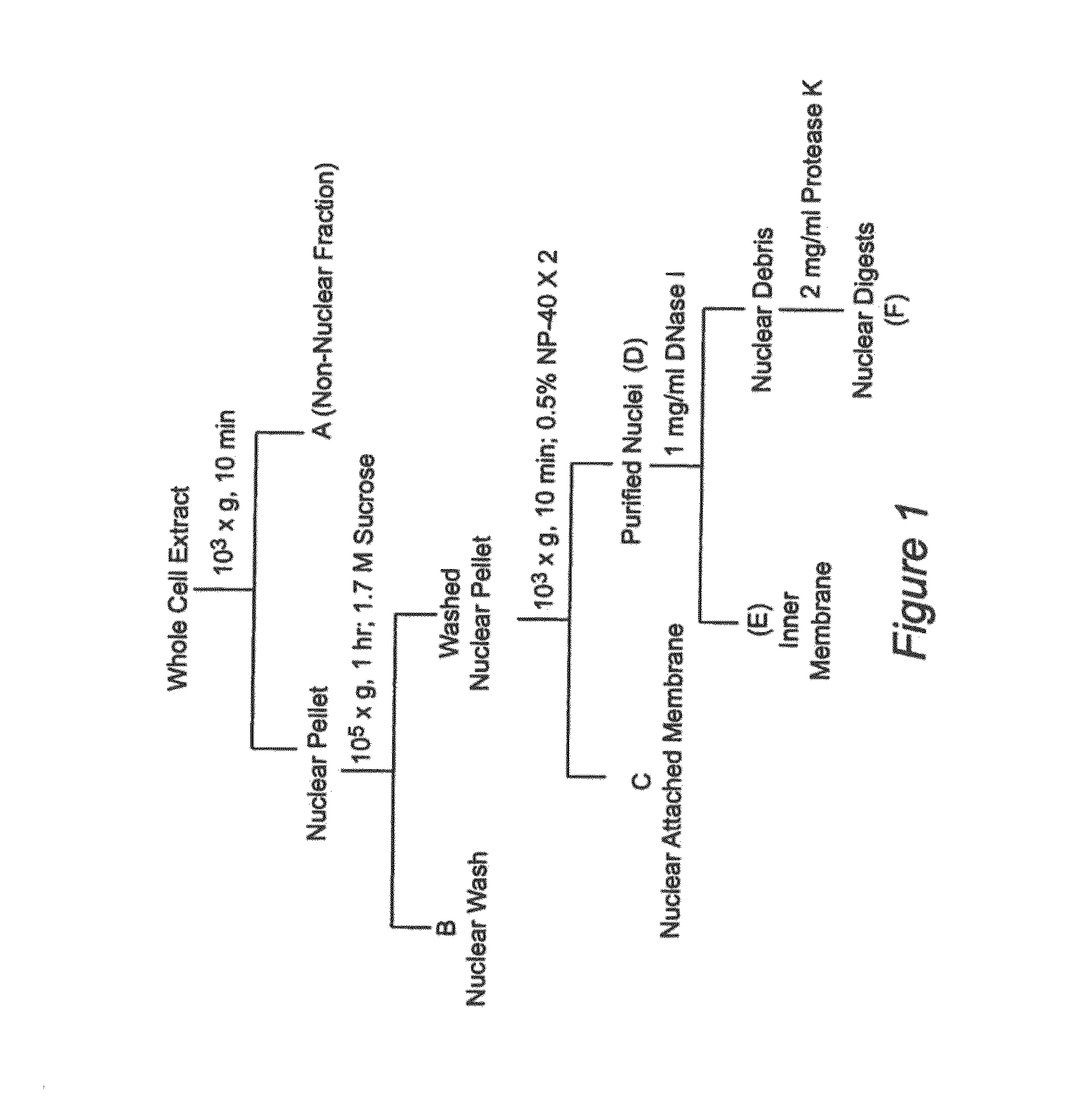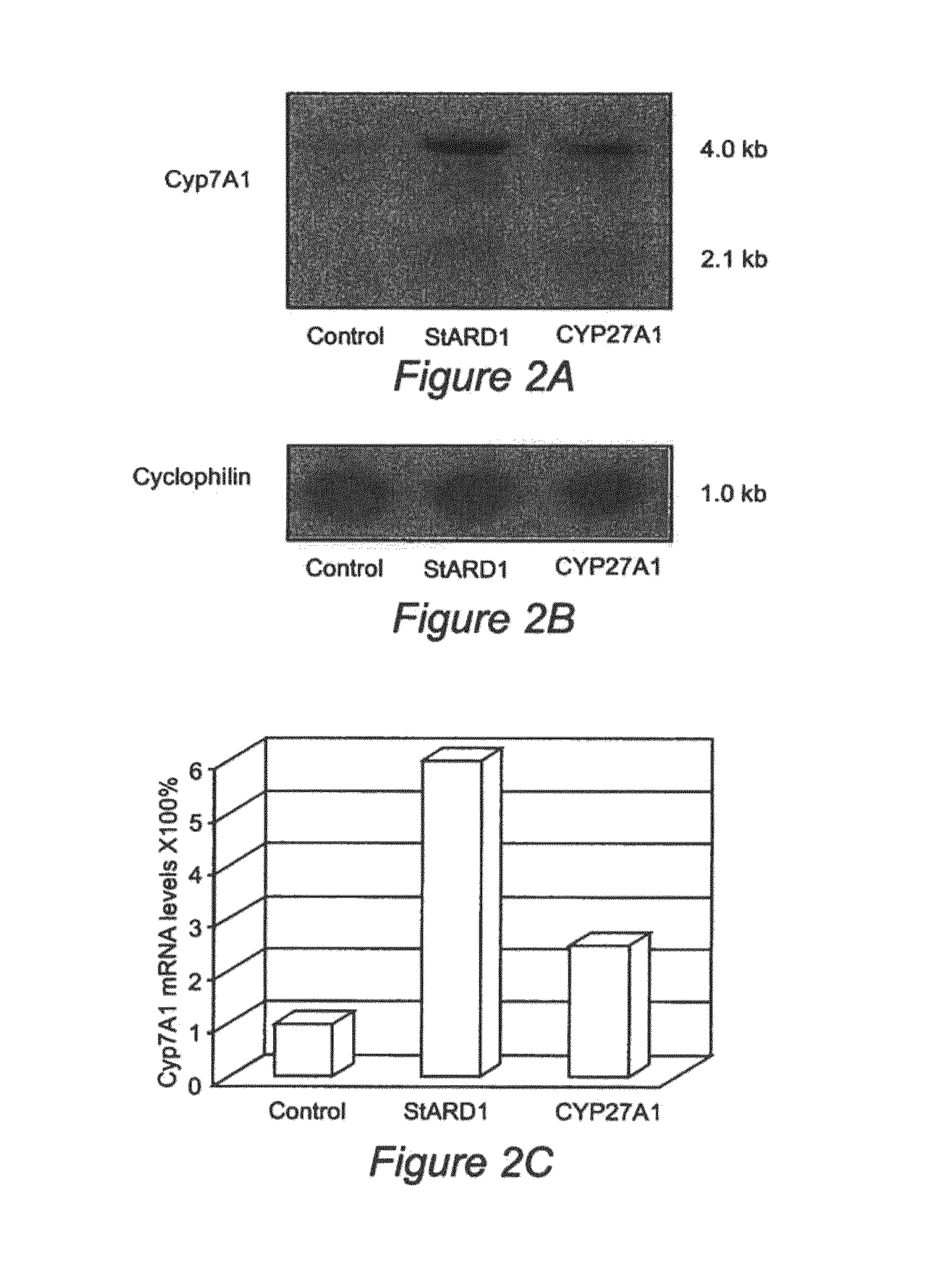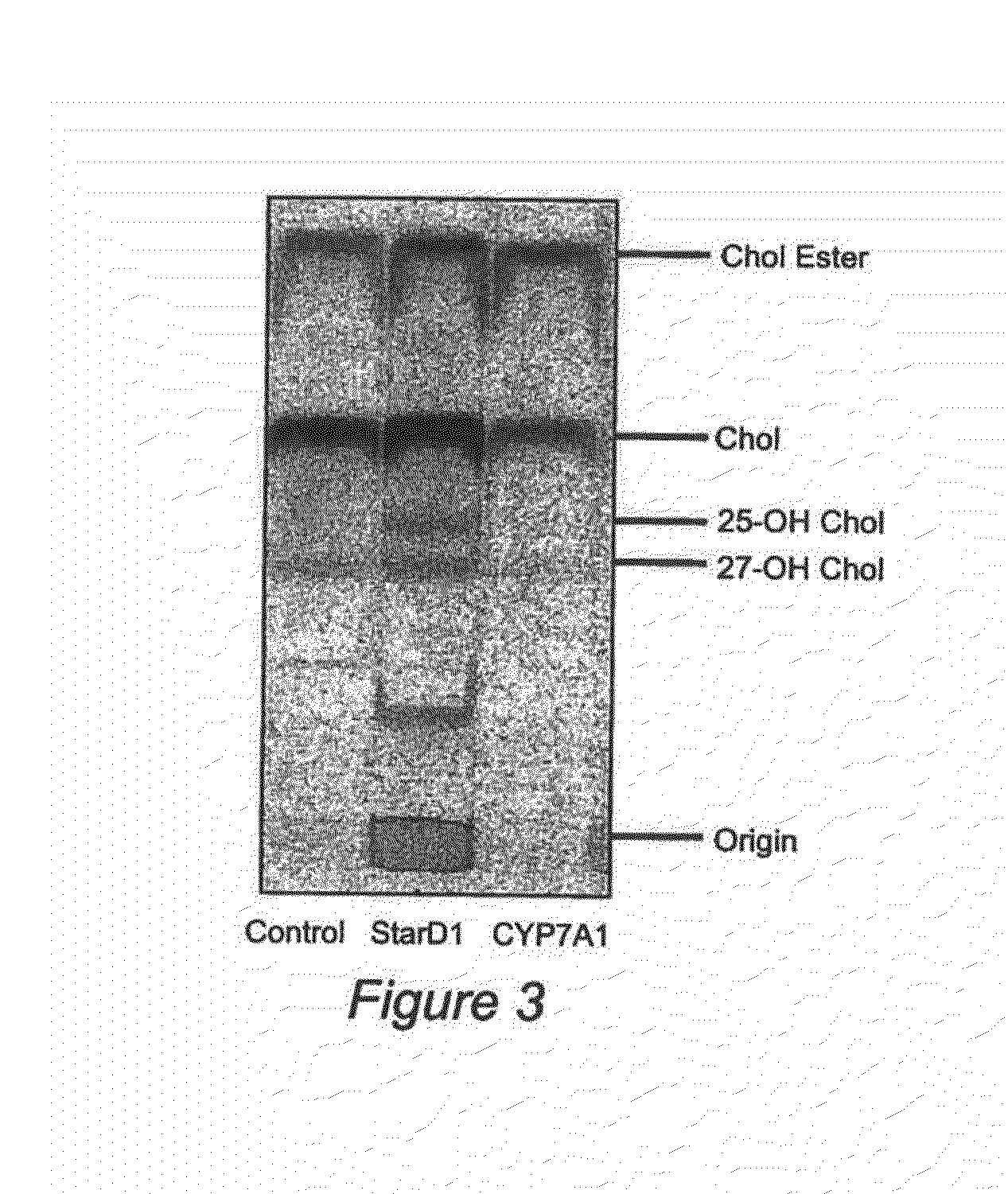Nuclear sulfated oxysterol, potent regulator of lipid homeostasis, for therapy of hypercholesterolemia, hypertriglycerides, fatty liver diseases, and atherosclerosis
a lipid homeostasis and nuclear sulfated oxysterol technology, applied in the field of lipid-lowering therapies, can solve the problems of liver inflammation, 35% of patients are responsive, death or severe disability via heart attack and/or stroke, etc., to achieve the effect of reducing lipid biosynthesis, increasing cholesterol secretion and degradation, and potent serum lipid-lowering properties
- Summary
- Abstract
- Description
- Claims
- Application Information
AI Technical Summary
Benefits of technology
Problems solved by technology
Method used
Image
Examples
example 1
REFERENCES FOR EXAMPLE 1
[0097]1. Russell, D. W. (2003) Annu. Rev. Biochem. 72, 137-174[0098]2. Hylemon, P. B., Gurley, E. C., Stravitz, R. T., Litz, J. S., Pandak, W. M., Chiang, J. Y., and Vlahcevie, Z. R. (1992) J. Biol. Chem. 267, 16866-16871[0099]3. Chiang, J. Y., Kimmel, R., and Stroup, D. (2001.) Gene 262, 257-265[0100]4. Saucier, S. E., Kandutsch, A. A., Taylor, F. R., Spencer, T. A., Phirwa, S., and Gayen, A. K. (1985) J. Biol. Chem. 260, 14571-14579[0101]5. Schroepfer, G. J., Jr. (2000) Physiol Rev. 80, 361-554[0102]6. Szanto, A., Benko, S., Szatmari, I., Balint, B. B. L., Furtos, I., Ruhl, R., Molnar, S., Csiba, L., Garuti, R., Calandra, S., Larsson, H., Diezfalusy, U., and Nagy, L. (2004) Mol. Cell Biol. 24, 8154-8166[0103]7. Dubrac, S., Lear, S. R., Ananthanarayanan, M., Balasubramaniyan, N., Bollineni, J., Slider, S., Hyogo, H., Cohen, D. E., Blanche, P. J., Krauss, R. M., Batta, A. K., Salen, G., Suchy, F. J., Maeda, N., and Erickson, S. K. (2005) J. Lipid Res. 46, 76-...
example 2
Demonstration of Up-Regulation of LXR Targeting Gene Expression
[0133]Preliminary experiments have shown that the purified nuclear oxysterol up-regulates bile acid synthesis. To further investigate the mechanism of this activity, the effect of purified 5-cholesten-3β, 25-diol 3-sulphate on gene expression of LXR-targeted cholesterol transport proteins ABCA1, ABCG1, ABCG5, ABCG8, and LDLR was investigated. Purified nuclear sulfated oxysterol was added to primary hepatocytes in culture, and mRNA levels of the transport proteins were quantitated by real time RT-PCR. The primer sets and TagMan probes for detection of mRNA levels were purchased from AB Applied Biosystem (Foster City, Calif.) and the reactions were performed on an MJ Research DNA Engine Opticon instrument. The results are presented in FIG. 12 and show that the addition of purified nuclear oxysterol to primary hepatocytes in culture increased expression of ABCA1 (2-fold) and ABCG5 (1.6-fold), and ABCG8 (3 fold). The express...
example 3
Synthesis of 5-cholesten-3β, 25-diol 3-sulphate
[0134]FIG. 12A shows a schematic illustration of the synthesis of the novel sulfated oxysterol of the invention by addition of a sulfate group to the 3β-position of 25-hydroxycholesterol. Synthesis was carried out as follows: A mixture of 25-hydroxycholesterol (0.1 mmol) and sulfur trioxide triethyl amine complex (0.12 mmol) in dry toluene was heated to 60 degree for 24 hours under nitrogen, then cooled and the solvent was evaporated under reduced pressure. The residue was purified by flash chromatography to afford the product as a white solid using the method of described above. FIG. 12B shows the mass spectrophotometric analysis of the HPLC purified product, which suggests that the sulfate group has been successfully added to 25-hydroxycholesterol.
[0135]FIGS. 12C and 12D show NMR data for the starting material, 25-hydroxycholesterol, and product, respectively. As can be seen, the resonance of C3 in the molecule has been shifted from 3...
PUM
| Property | Measurement | Unit |
|---|---|---|
| pH | aaaaa | aaaaa |
| flow rate | aaaaa | aaaaa |
| real time RT- | aaaaa | aaaaa |
Abstract
Description
Claims
Application Information
 Login to View More
Login to View More - R&D
- Intellectual Property
- Life Sciences
- Materials
- Tech Scout
- Unparalleled Data Quality
- Higher Quality Content
- 60% Fewer Hallucinations
Browse by: Latest US Patents, China's latest patents, Technical Efficacy Thesaurus, Application Domain, Technology Topic, Popular Technical Reports.
© 2025 PatSnap. All rights reserved.Legal|Privacy policy|Modern Slavery Act Transparency Statement|Sitemap|About US| Contact US: help@patsnap.com



